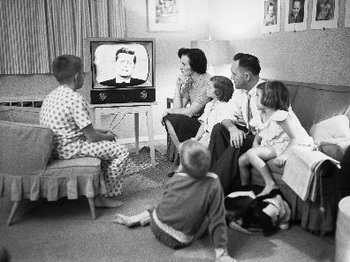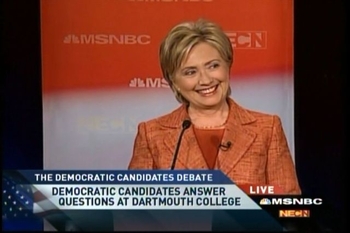
"It was a devastating commentary on the nature of television as a political medium that what hurt me the most in the first debate was not the substance of the encounter between Kennedy and me, but the disadvantageous contrast in our physical appearances. After the program ended, callers, including my mother, wanted to know if anything was wrong, because I did not look well."
People who heard the debate on the radio thought Nixon won. People who watched it on TV thought Kennedy won. The election was very close, but Kennedy took it — and, who knows, maybe so did TV.
Fast forward to today's presidential race, and the zillion and one debates that are cramming the airwaves. Turns out, it's not enough just to have a good soundbite ("I'm your girl!") or not misunderstand the question — you also have to not look shifty, fidget, appear weak or waffly, smile too little or too much, laugh inappropriately, make giant hand gestures, have a floppy handshake or blink too much. Because if you do, we'll all see through you. That's the message of today's WaPo story by Amy Argetsinger, who watched Wednesday's Dem debate with non-verbal communication experts John Neffinger, Matt Kohut and Seth Pendleton. (Let's get the disclosure out of the way right now: I have watched many a debate with Neffinger, who is a HuffPo contributor as well as your ETP editor's occasional escort). The non-verbal thing has been an essential element of this campaign as pundits have strived mightily to convey what they mean when they call someone "presidential" or try to figure out why Barack Obama is exploding and/or plateauing or proclaim that Fred Thompson is the Republicans' last great hope, even though no one really much bothered to investigate what he thought about various matters, or knew. Neffinger and his partners have argued that "presidential" comes down to conveying the magic combination of strength and warmth, which is why they were all kvelling over Hillary Clinton at the beginning of the article when she shut down Tim Russert, and here:
But Clinton's always been adept at conveying strength. Warmth? Still a new thing for her. So the test comes at the moment when Clinton declares she opposes torture, even to cadge information about an imminent terror attack — and Russert notes, gotcha!-style, that her husband disagrees.
"Well, he's not standing here right now," retorts Clinton, staring down Russert — and then breaks out in a coy grin: "Well, I'll talk to him later."
Anyone who doubts the power of that magic strength-warmth combination need only look as far as George Allen , who was considered the Republican heir apparent — so Reaganesque! So real! — before he crashed and burned after a moment that showed him 
Of course, the days of gathering 'round the TV set for debates are long since gone, but all that means is new interfaces for consumption, and new opportunities for candidates to adapt (or crash and burn). WaPo's Jose Antonio Vargas made that point after the HuffPo/Slate/Yahoo Mash-Up debate earlier this month, noting that just as TV edged out radio, so to might the Internet be rendering TV tactics useless:
But it seems that no matter the format, no matter the amount of online citizen participation, it's hard to knock politician out of their talking points....Indeed, so far this new media-driven debate season, the candidates haven't successfully tailored their message to a Web audience.
[The Internet, the medium of the people -- at least those with a high-speed Internet connection -- is shattering the divide that's long separated politicians from their constituencies. The audience wants to share the stage, and candidates looking to take advantage of a shifting media landscape need to change their tune.
It's a tad depressing to talk about messaging rather than message, just as it is to concede primacy to the medium. But the flipside is, of course, how much further your message can go once you figure out what's been holding you back, and then the little tricks that can help take it further. And maybe it's not depressing at all — it's just one Candadian's opinion, but you people seemed to have been pretty happy with Kennedy.
Related:
The Medium is The Message [WaPo]
Democrats vs. Science: Why We're So Damn Good at Losing Elections [HuffPo]
Related in Classic Movie Lines:
"We didn't need dialogue, we had faces!" [Sunset Boulevard]
Related in Songs That Sound Romantic, But Really Aren't:
You Say It Best When You Say Nothing At All [Ronan Keating]